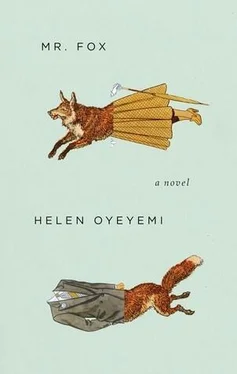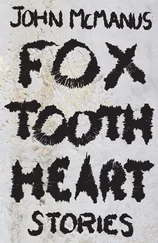He slumped against the wall of her room, with his legs stuck out in front of him. His eyes were open, but when she spoke to him, he didn’t look at her. He didn’t breathe. His heart didn’t beat. His lips were blue. Brown lay down with him, and she tried to give him breath, and she asked him if he was dead.
“I don’t know,” Reynardine answered from the doorway. “Probably.”
And Brown turned to him and cried out: “Reynardine! Reynardine! What have you brought me?”
Reynardine tutted. “I brought you what you lost.”
“But he’s still lost! You tricked me.”
“Listen,” said Reynardine. “Have you considered joining him?”
Brown sat listening, thinking. She held her man’s hand, and she didn’t feel able to let go just then.
“I dare you,” Reynardine said, “to be lost together.”
She wasn’t as worried as she could have been. She had recently been visited by people long deceased. They had seemed well enough, and had even been so bold as to make demands of her. She accepted the dare.
Reynardine snapped his fingers, and she stopped living.
Stiffly entwined in each other’s arms, the two lovers were moved to Père Lachaise sans coffins, and at dead of night. Reynardine took care of that. He was owed favours and he made the arrangements. It’s said that Reynardine is monstrously cruel, but sometimes, to a woman who takes him at his word, he can show kindness.
The first moment in the tomb was the most forbidding. The silence, the stillness, the dark.
Then they realised: They were together, and there was no one else. She felt his lips tremble against her forehead. After that he became courageous and brought his arms down around her. He kissed her closed eyelids and he kissed her mouth and he kissed handfuls of her hair and he kissed her elbows. She placed her brass ring on the palm of his hand and closed his fingers around it. He opened his hand and the ring was gone. It had not fallen, unless it had fallen through him, and if so, it had left no mark. No more counting kisses.
Reynardine had thrown a candle and a box of matches in with them. They didn’t need the candle. . In the darkness they learnt to waltz. Then they lit the candle anyway — why not? And they let its flame warm their stone house for a little while as they danced on behind their locked door.
Mary Foxe saved my life once. She has a vested interest, of course — if I go, she goes. But she didn’t do it as if she had a vested interest. She did it as if she cared. It was nine, maybe ten, years ago. Before Daphne. I was working late at night, trying to get something down about a boy at war; he’d signed up to be a hero and had all sorts of ideas about standing aloof from both his equals and his superiors. I couldn’t yet tell whether this kid’s stupid ideas were going to get him killed, or whether he was simply going to be slapped down and made useful in some minor way. It was not a story about me — in France I learnt to do exactly what I was told. I’m talking about the Marne — frontal assaults; don’t blink, don’t think, just do. I looked around my study and everything was just too damn cosy. The anodyne calm. The gentle, sputtering dance of the fire, and the books that towered all around me, their spines turned out. I couldn’t write down the echo of an exploded shell. I couldn’t smear the smell of the trench across the page. I couldn’t do this thing so that anyone could see what I meant. The things that had happened — things I laughed at when they crossed my mind — you can’t hold on to them too long, unless you want to go crazy. The dead don’t trouble me — dead is dead. It’s the ones who took impact and lived. Joe Persano: Shrapnel put his left eye out, and he refuses to wear an eye patch; a glass eye rolls slightly in the crumpled hole left for it. Tom Franklin has no hands. Ivor Ross’s right trouser leg is empty and half his mouth is puckered up for a sour, perpetual kiss. And here I am, whole. It got so I had a pistol to my head, there in my cosy study, and I wasn’t at all sure that I’d taken it out of my desk drawer myself. I must have been holding it, but there was no feeling in my fingers; the gun seemed to be floating, held up by Joe’s ill will, Tom’s, and Ivor’s. The gun’s nozzle pushed at my skin, as if trying to find the correct part of my skull to nestle against. Death like the insect, menacing the tree. .
“Shhh,” said Mary Foxe. She reached over my shoulder, prised my fingers loose one by one, and took the gun. Then she stuck a pipe in my mouth. I watched tobacco trickle into the bowl. I watched her hand, tamping the tobacco down. Tap, tap, tap, and the pipe moved between my clenched teeth. Tap and pour, tap and pour. She lit a match, and I watched the flame circle the bowl once, twice, three times, before it took and a mist rose.
“I know you think you’re going mad,” she said. “But you’re not. Don’t be perverse. Celebrate.”
She poured some scotch from the decanter on my windowsill and pushed the glass towards me. Between that and the pipe my sense of perspective began to return. I opened the desk drawer and the gun was in there, looking innocent, as if it hadn’t had an outing this evening, or ever.
Mary sat down and set the decanter at her feet. “Say something, you,” she said warningly.
“Mary,” I said. “I seem to have a memory — false, I hope — of you being my wife at some point.”
Mary stirred in her seat. “Oh, yes?”
“Yes. My loving wife. I did all I could for you. But you weren’t happy. You said I didn’t listen to you and that I treated you like a child. You moved out of the nice house I was working overtime to pay for, the house I bought because you said you liked it. I waited a week — everyone told me to give it time, that you’d come to your senses. I was always home on time, and never ran around on you. On weekends I drove you all over town like I was your chauffeur, took you to see the friends you wanted to see. I took you to the opera on your birthday, for crying out loud. I hadn’t put a foot wrong. But you didn’t come back. Your friends had lent you money and you’d moved into some tiny one-room apartment. I found that out by visiting a friend of mine who was married to a friend of yours. He said he didn’t want to get involved because his wife would raise hell for him if she ever found out he’d told me. So I turned on the waterworks. It shocked him so much he told me where you were and said he hoped I got you and my manhood back. . ”
I stopped for a while, because it was strange. The more I said, the clearer the memory became. I didn’t think I was going to be able to say any more — I just wanted to watch the thing play out in my head. Mary poured me some more scotch. That helped.
“I went round at dusk. I was drunk as drunk — that was my preparation for the possibility that there might be another guy there with you. I knocked on your door — I knocked with my head and my elbows, like I was trying to dance with the door. Amazingly, you opened the door, with this resigned look on your face that said you’d been expecting me. I said: Honey, and something else, something like Honey, look at me, can’t you see how it is? Come home. And you looked kind of sorry for me. But I saw that you had a chain on the door, and you kept it on even when you saw that I was just a wreck, and begging. When I saw that you had that chain on, I knew I was going to hurt you. I was going to get in there and hurt you. It was kind of like caging up an animal — something — the bars, the boundaries hard and cold like that — it just makes the animal as mad as hell, even if it was just a fluffy little lapdog before. It becomes another thing altogether. I stood up straight and I lowered my voice and, I don’t know how, because I was out of my skull drunk and could barely move my tongue, I began to talk to you as if I was sober and possessed of reason. I spoke warmly and with understanding and had some soothing response to every objection you made to letting me in. You let me in, and I almost fell in through the door, but I told myself keep it together, keep it together, you still love her. There was no one else there; you were all alone. I was so glad. I was so glad. I tried to hold you, to get a kiss from you. And you said, St. John, you’re hurting me. I only wanted to kiss you — how could that be hurting you? But you kept saying that I should ‘stop it.’ I’d slapped you a few times by then. Trying to make you quiet.”
Читать дальше












